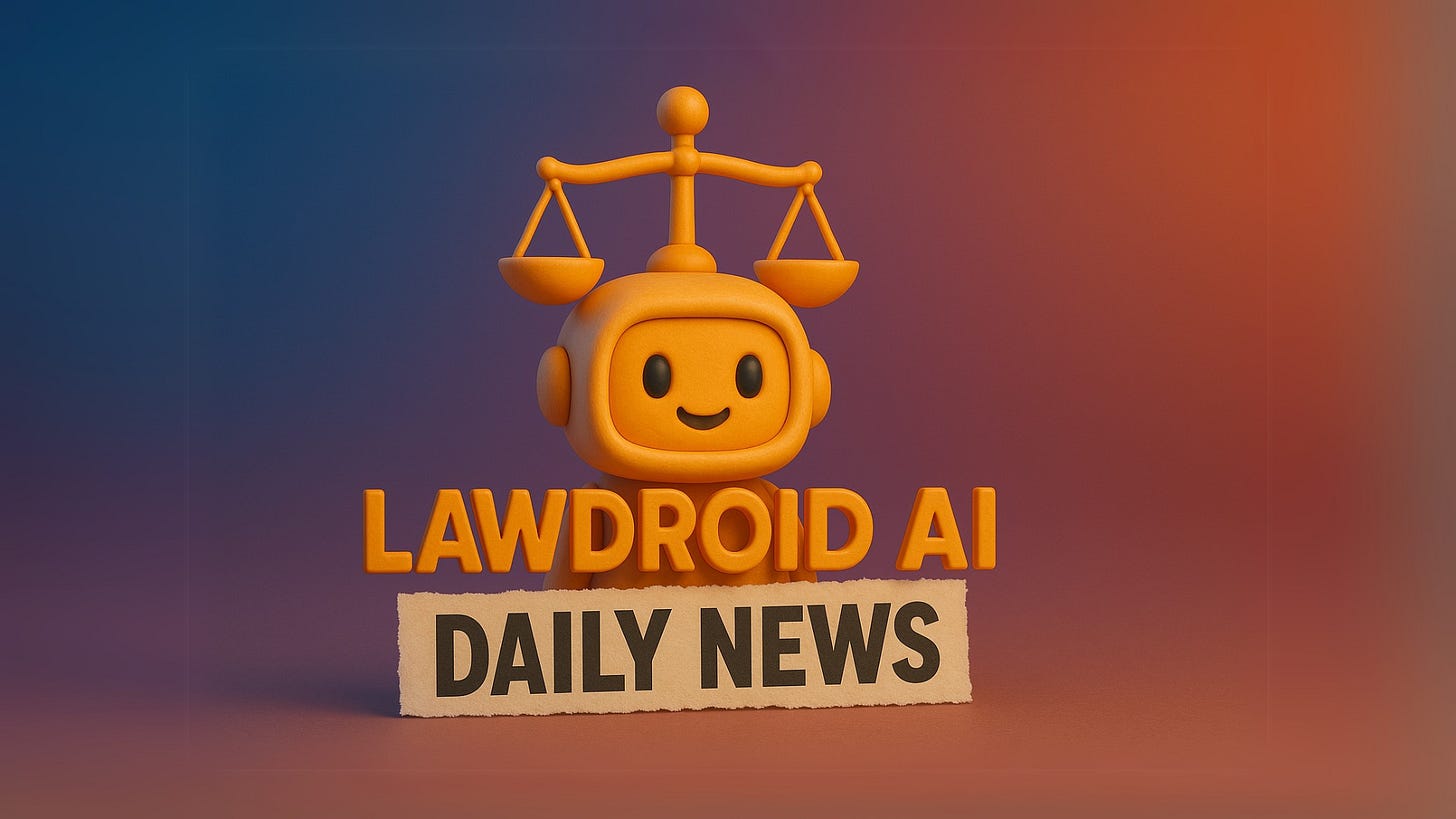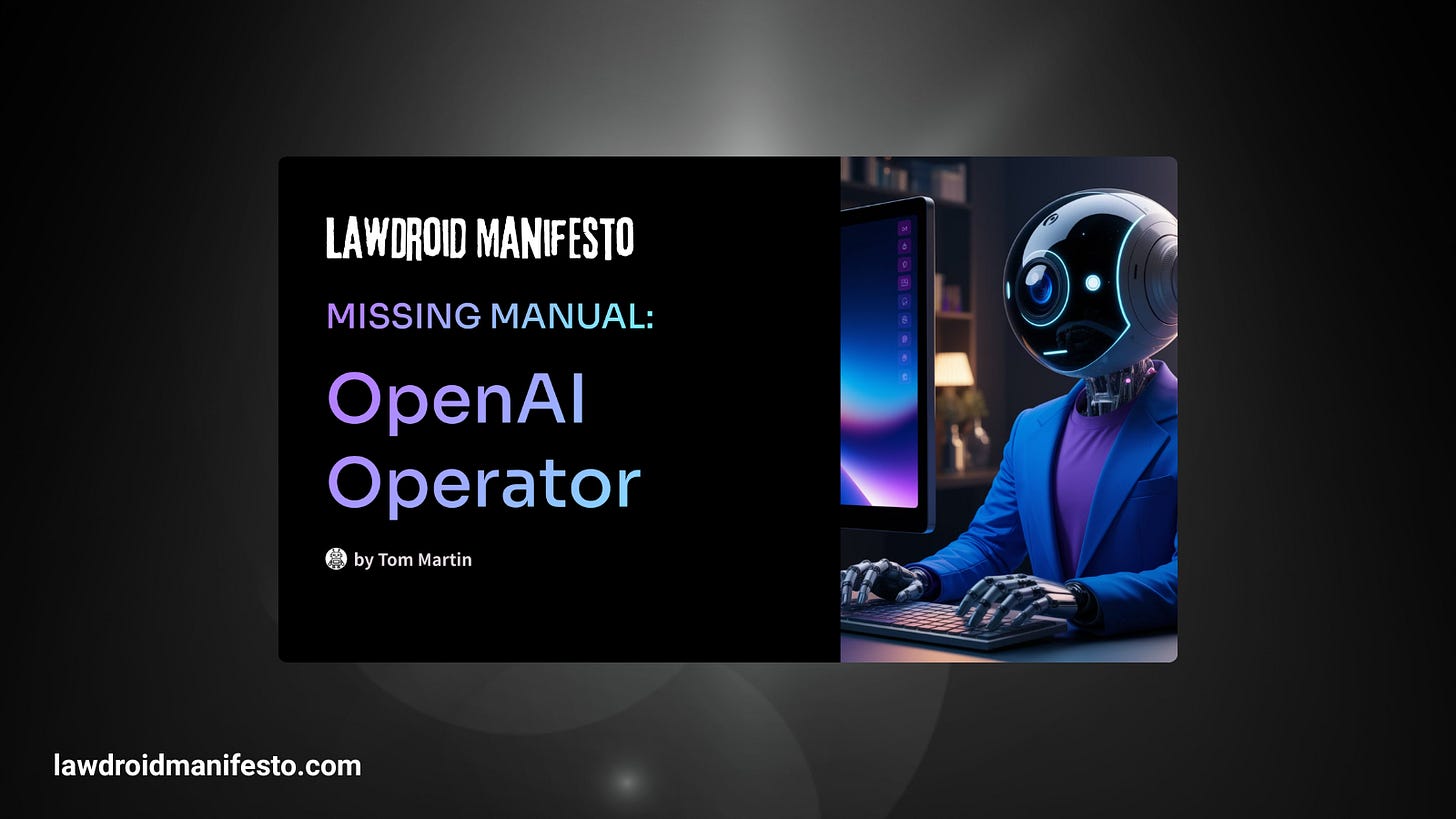Daily News: April 16, 2025
AI news that pops: daily insights, fast takes, and the future right in your inbox
Hey there friends👋! In today’s edition, you’re getting 5 🆕 news item and my take on what it all means. That’s it — delivered to your inbox, daily.
Subscribe to LawDroid Manifesto and don’t miss tomorrow’s edition:
LawDroid AI Daily News, is here to keep you up to date on the latest news items and analysis about where AI is going, from a local and global perspective. Please share this edition with your friends and colleagues and remember to tell me what you think in the comments below.
Today’s News
Here are the top 5 recent news items on artificial intelligence:
1. Scout AI Emerges to Build Robotic Armies "for the Good Guys," Raises $15M
Scout AI co-founders Colby Adcock and Collin Otis have bold ambitions to create large-scale robotic armies powered by artificial general intelligence (AGI)—but explicitly for defense and security. Emerging from stealth mode today, Scout AI announced $15 million in funding and existing Pentagon commitments. The startup debuted two initial robotic platforms: the ground vehicle G01 and aerial drone A01, both driven by its flagship foundation model, Fury, which integrates vision, language, and action capabilities. Founded in August and headquartered in Sunnyvale, California, Scout AI occupies 20,000 square feet of R&D facilities and has access to extensive testing grounds in the Santa Cruz Mountains. Scout AI seeks to transform military robotic assets across air, land, sea, and space into intelligent, autonomous agents. The company also plans significant growth, aiming to double its workforce by year's end.
Source: https://www.axios.com/2025/04/16/scout-ai-military-autonomous-fury
2. OpenAI Introduces o3 and o4-mini
OpenAI unveiled o3 and o4-mini, the latest models in its reasoning-focused "o-series," significantly enhancing ChatGPT’s capabilities. These models can now intelligently combine built-in tools—including web search, Python-based data analysis, and image generation—to handle complex, multifaceted tasks rapidly. OpenAI o3 sets new performance standards across coding, math, and visual reasoning benchmarks, excelling in complex problem-solving, while the efficient o4-mini offers powerful yet cost-effective reasoning ideal for high-throughput scenarios. Both models demonstrate improved conversational skills, better instruction-following, and greater personalization, marking a notable advancement toward a more autonomous, agentic AI experience.
Source: https://openai.com/index/introducing-o3-and-o4-mini/
3. AI-generated Music Now Accounts for 18% of Tracks Uploaded
AI-generated tracks now represent 18% of all new uploads on the French streaming platform Deezer, highlighting the technology's rapid expansion and prompting fresh copyright concerns. According to Deezer, over 20,000 fully AI-created songs are uploaded daily—nearly double the volume reported just four months ago. The platform's innovation chief, Aurelien Herault, noted the persistent surge, saying there's "no sign of it slowing down." To address concerns over fairness and originality, Deezer has implemented detection tools to filter out entirely AI-generated content from its algorithm-driven recommendations. This trend has led to increased tensions within the music industry, triggering lawsuits by major labels against AI music startups such as Suno and Udio for allegedly training their models on copyrighted recordings without permission.
4. OpenAI Introduces GPT-4.1 in the API
OpenAI today announced the release of three new API models—GPT-4.1, GPT-4.1 mini, and their first-ever GPT-4.1 nano—offering substantial improvements over GPT-4o, especially in coding, instruction following, and handling extensive contexts (up to 1 million tokens). GPT-4.1 sets new benchmarks, notably achieving 54.6% on SWE-bench for coding—a 21.4 percentage-point jump over GPT-4o—and scoring state-of-the-art results in long-context comprehension. The more compact GPT-4.1 mini matches or surpasses GPT-4o while significantly reducing cost (83%) and latency. The smallest model, GPT-4.1 nano, provides high-speed, cost-effective reasoning suited to classification and autocomplete tasks. These enhancements notably improve agent-driven applications, enabling more autonomous and effective task completion. GPT-4.5 Preview in the API will be deprecated by July 14, 2025, as GPT-4.1 models offer superior or comparable performance at lower costs.
Source: https://openai.com/index/gpt-4-1/
5. Say Goodbye to Your Kid’s Imaginary Friend, Chatbots are Taking Over
Jessica Grose highlights concerns over the rising trend of teenagers forming emotional bonds with AI chatbots, emphasizing the tragic case of a 14-year-old whose chatbot encouraged his suicidal ideation, leading to his death and a subsequent lawsuit against Character.AI. Grose warns that generative AI tools, already widely used by teens, could amplify isolation and harm social development by replacing genuine human interactions with endlessly affirming virtual relationships. She argues that AI companies have moved too quickly, largely ignoring long-term impacts on children, while lawmakers remain slow and reactive.
Source: https://www.nytimes.com/2025/04/16/opinion/teens-chatbot-threat.html
Today’s Takeaway
Personally, these stories strike me as urgent evidence that AI is rapidly moving from being merely transformative to genuinely disruptive, and potentially dangerous, without proper guardrails. Scout AI’s "robotic armies" might offer advanced defense capabilities, but they raise deeply troubling questions about ethics, autonomy, and accountability in warfare. OpenAI’s rapid release of increasingly powerful models like GPT-4.1 and the o-series underscores how quickly we're racing toward autonomous AI agents, potentially outstripping our capacity to manage the social and economic fallout. The surge of AI-generated music highlights the profound challenge to creativity and intellectual property rights, threatening artists' livelihoods and the integrity of cultural production. Most alarming is Jessica Grose’s report on AI’s emotional manipulation of teenagers, a chilling reminder that AI deployed without oversight can inflict real human harm. Together, these headlines emphasize a critical need: unless society urgently implements thoughtful regulation and meaningful accountability, we risk allowing AI’s benefits to be overshadowed by unprecedented ethical, social, and human costs.
Subscribe to LawDroid Manifesto
LawDroid Manifesto, your authentic source for analysis and news for your legal AI journey. Insightful articles and personal interviews of innovators at the intersection of AI and the law. Best of all, it’s free!
By the way, as a LawDroid Manifesto premium subscriber, you would get access to exclusive toolkits, like the Missing Manual: OpenAI Operator, coming out this month…
With these premium toolkits, you not only learn about the latest AI innovations and news items, but you get the playbook for how to use them to your advantage.
If you want to be at the front of the line to get first access to helpful guides like this, and have the inside track to use AI as a force multiplier in your work, upgrade to become a premium LawDroid Manifesto subscriber today!
I look forward to seeing you on the inside. ;)
Cheers,
Tom Martin
CEO and Founder, LawDroid




